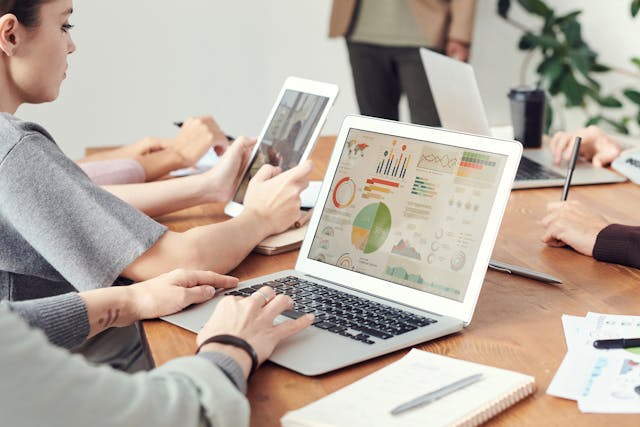A Game-Changer for HR: Sarah’s Story
Sarah, an HR director at a fast-growing tech startup, found herself overwhelmed by the increasing demands of managing a growing workforce. Employee queries were piling up, recruitment processes were lagging, and performance reviews were time-consuming.
Then, Sarah’s company integrated AI-driven HR solutions. AI-powered chatbots handled routine queries, automated recruitment tools shortlisted candidates, and AI-driven analytics provided real-time insights into employee engagement. Within months, Sarah’s HR team shifted from being overburdened to becoming a strategic powerhouse.
Sarah’s story reflects a broader transformation: AI is reshaping HR, automating mundane tasks, enhancing decision-making, and driving a more employee-centric approach. But what are the key AI trends in HR, and what does the future hold? Let’s explore.
The Rise of AI in HR
HR is no longer just about paperwork and administrative tasks. The integration of Artificial Intelligence (AI) in HR is revolutionizing the field, bringing efficiency, personalization, and strategic insights. According to research by PwC, 72% of executives believe AI will be a fundamental business advantage in HR management.
Why AI is Becoming Essential in HR
✅ Automation of Repetitive Tasks – AI eliminates time-consuming processes like resume screening and employee query handling.
✅ Enhanced Employee Experience – Personalized learning recommendations and AI-powered wellness programs improve engagement.
✅ Data-Driven Decision Making – AI provides HR professionals with predictive insights to optimize workforce planning.
✅ Bias-Free Recruitment – AI-driven hiring tools help reduce unconscious bias and improve diversity in recruitment.
Now, let’s dive into the biggest AI-driven trends reshaping HR today.
AI Trends Transforming HR
1. AI-Powered Recruitment and Hiring
The traditional hiring process is time-consuming and often biased. AI is revolutionizing recruitment by:
- Automating Resume Screening – AI algorithms analyze resumes, filtering the best-fit candidates based on skills and experience.
- AI Chatbots for Candidate Engagement – AI-powered virtual assistants interact with candidates, schedule interviews, and answer queries.
- Predictive Analytics in Hiring – AI predicts candidate success by analyzing past performance, skills, and cultural fit.
📊 Statistic: Companies using AI in hiring see a 30% reduction in time-to-hire and a 23% increase in quality of hires (LinkedIn Talent Report).
2. Employee Experience and AI Chatbots
HR teams are turning to AI-powered chatbots to enhance employee support and improve engagement.
- AI Virtual Assistants – These handle FAQs on benefits, leave policies, and compliance.
- Sentiment Analysis – AI tools analyze employee feedback to detect burnout and dissatisfaction.
- 24/7 Support – Employees get immediate responses, reducing the HR team’s workload.
💡 Case Study: A Fortune 500 company implemented AI chatbots for HR queries and saw a 60% reduction in HR support tickets.
3. AI in Performance Management
Traditional performance reviews are often biased and lack real-time insights. AI is making them more data-driven and objective by:
- Providing Real-Time Feedback – AI monitors employee performance and suggests improvements.
- Skill Gap Analysis – Identifies areas where employees need upskilling.
- Objective Performance Reviews – AI removes bias and focuses on actual performance metrics.
📊 Statistic: Companies using AI-driven performance management see a 20% increase in employee productivity (Harvard Business Review).
4. AI-Driven Learning and Development (L&D)
AI is personalizing employee training by analyzing learning preferences and career goals.
- Personalized Learning Paths – AI suggests courses tailored to an employee’s career trajectory.
- Microlearning with AI – Short, targeted training modules enhance knowledge retention.
- AI-Powered Mentorship Matching – AI pairs employees with the right mentors based on skills and aspirations.
📌 Example: AI-powered learning platforms improve skill retention rates by 45% compared to traditional training.
5. Predictive Analytics for Workforce Planning
AI is transforming workforce planning by predicting future hiring needs, attrition rates, and employee engagement trends.
- Attrition Prediction – AI analyzes data to identify employees at risk of leaving.
- Optimized Scheduling – AI tools ensure optimal staffing levels.
- HR Forecasting – Helps organizations prepare for future talent needs.
📊 Statistic: Businesses using AI-driven workforce analytics reduce turnover rates by 35% (Gartner).
6. AI in Diversity, Equity, and Inclusion (DEI)
AI helps remove biases in hiring, promotions, and salary decisions by:
- AI-Based Bias Detection – Identifies and removes biased language in job descriptions.
- Diverse Candidate Sourcing – AI expands recruitment efforts to attract diverse candidates.
- Fair Performance Evaluations – AI ensures fair and unbiased assessments.
💡 Case Study: A multinational firm used AI-driven DEI tools and saw a 25% increase in workforce diversity.
What’s Next? The Future of AI in HR
As AI technology advances, we can expect:
✅ Greater AI-Human Collaboration – AI will augment HR roles, not replace them.
✅ Hyper-Personalized Employee Experiences – AI will tailor HR processes to each individual.
✅ Increased AI Adoption in Small Businesses – AI tools will become more accessible to SMEs.
✅ Regulations on AI Ethics in HR – Governments will introduce AI ethics guidelines to prevent biases.
Final Thoughts: The Role of AI in Shaping HR’s Future
AI is not just a trend—it is the future of HR. By automating administrative tasks, improving hiring accuracy, enhancing employee engagement, and driving data-backed decisions, AI is transforming HR into a strategic, people-centric function.
However, successful AI adoption in HR requires human oversight, ethical AI implementation, and continuous learning. Organizations that embrace AI responsibly will lead the future workplace, while those that resist may struggle to keep up.
🔹 Key Takeaway: AI in HR is not about replacing human roles—it’s about empowering HR professionals to create a better workplace.
Are you ready for the AI-powered future of HR? 🚀
